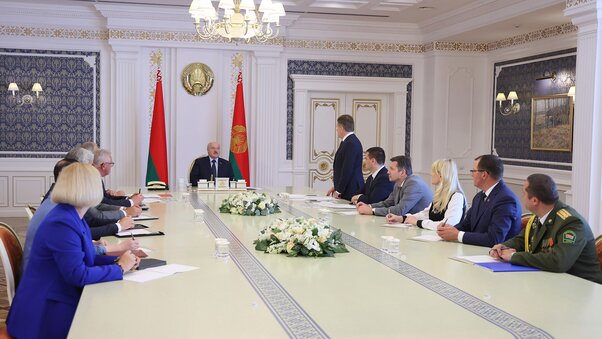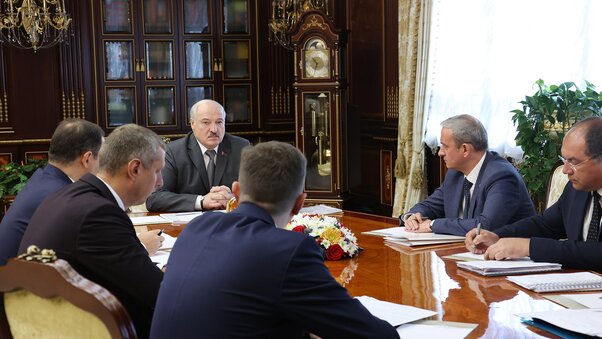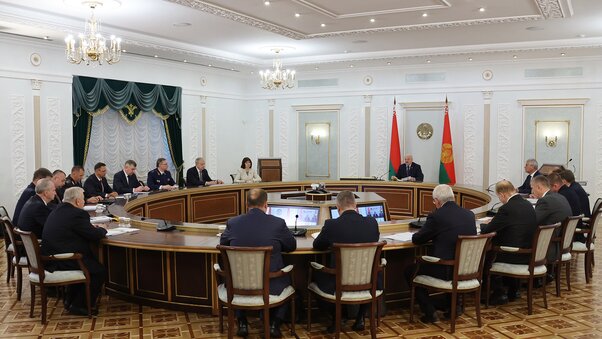Meeting to discuss development of civil society, work of political parties and public associations
- 9
- 14:44
Bills regulating the development of civil society, work of political parties and public associations are discussed at a conference hosted by Belarus President Aleksandr Lukashenko.
The president had previously given instructions to create the legal foundation for political party system development and the development of a civil society in Belarus. Participants of the conference are expected to discuss a bill on civil society and a bill on amending the laws regulating the operation of political parties and other public associations.
Both bills are of vital importance, Aleksandr Lukashenko remarked.
He noted right away that the discussion of the relevant bills would meet severe criticism from supporters and opponents of the government.
“Our supporters will criticize us (and rightly so) for going ahead with it and launching party construction processes in the country at a wrong time. And the creation of political parties as a result. It is not the right time for it. The situation in the world is extremely tense. In such times any state starts mobilizing and concentrating around one or two figures and so on. In Belarus it is the president according to the Constitution, it is unavoidable. But here we start building the political party system and new parties will emerge. Naturally new centers of force will emerge. Naturally the society will be structured. People will be mobilized around these parties. So at a time when we have to unite, we seem to be launching the process of some disunity. So our supporters will criticize us and they will be right. On the other hand, if the bills are passed, they will face criticism due to the lack of democracy, due to the creation of some peculiar political system. On the whole, we will be criticized for insufficient radicalism,” the president believes.
Aleksandr Lukashenko went on saying: “But I proceed from what we've promised. Back in the day before the Constitution was adopted. And the Constitution reflected it. We promised to our society that we will address these issues. Since we've promised it, we have to act on these promises. It seems we were adopting the Constitution at a wrong time either. Our supporters criticized us for it, saying people were not ready and urging us to reject the idea. But it turned out that people are smarter than us. They backed the Constitution, we passed it. The constitutional reform process made our society stronger instead of disuniting it. This is why we have to do it since we've promised it. I think we will calmly go through this stage despite domestic complications (there is no need for simplification) and foreign ones.”
The president stressed the relevant matters should be addressed while bearing in mind what is happening in the country. “It is necessary to proceed from our reality. And form these guidelines on political party system development, on civil society bearing in mind our reality. There is no need to invent anything. There is no need to look far into the future. Because we don't know what will happen tomorrow. We don't know what the world will be,” he said.
“The process will go on. We are also going to improve our political party system and our civil society. In other words, we have to land and stay on the ground. It is the most important thing for us today in order not to deviate and make errors,” the Belarusian leader stressed.
Aleksandr Lukashenko remarked that the current discussion continues the objective constitutional process. “Essentially a new stage of development of the public sector is about to begin,” he noted.
The adoption of the bills will become an important step in the development of the state, he stressed. “The working capacity of the country's entire political system will depend on their effectiveness. Today and in the future,” Aleksandr Lukashenko said.
Aleksandr Lukashenko reminded that when post-Soviet republics were easily abandoning the experience of the USSR and going ahead with social and political experiments, Belarus did not rush to break something fast and approached all the matters in a thoughtful manner.
“Time has proven we did the right thing. We've managed to preserve both the trade unions and the communist party, against which everyone was opposed, primarily in the Russian Federation. But I saw that this war against the communist party in Russia primarily relied on personal preferences of the first Russian president. I was on good terms with him. And I knew the situation inside out. And I understood that we should not follow this course. Life has demonstrated that our communist party has never been an enemy and an opponent of the processes we are carrying out in Belarus,” the president said. “We've recreated the leading youth organization – pioneers. It is the Belarusian Republican Youth Union (BRSM) now. We've recreated the Belarusian Union of Women, the association of veterans, and so on.”
Aleksandr Lukashenko stated that Belarus actually has a civil society. It includes the already mentioned organizations and public associations as well as trade unions. “They are the main pillars of our civil society. They are reliable pillars of our state. The capital we've inherited from the Soviet Union. We've diligently preserved it and multiplied it,” he stressed.
The head of state stated that time goes on and a more complicated configuration for interaction between the state and the civil society is emerging in the sovereign country of Belarus unlike in the Belarusian Soviet Socialist Republic. New organizations intent on accomplishing tasks of public importance are emerging. “And it is good because it is necessary to counteract challenges in modern life together,” the Belarusian leader is convinced.
The president remarked that some requirements will be presented for registering political parties and for evaluating the operation of political parties. “What should those requirements be? How can one determine whether a political party is acting correctly or not? We have an excellent organization – the Belarusian People's Congress. Political parties and the civil society will be represented there. The Belarusian People's Congress will determine contours of our future, the track the state will go along. Everyone will be present. And, please, follow the policy the Belarusian People's Congress will determine,” Aleksandr Lukashenko stated. “Deviating to the right or to the left should be followed by the liquidation of the political party or the public movement. Only then will we be able to keep the country on some track, within some framework. It is my suggestion to the bill. You and I are going to discuss it and if it is acceptable, it will be a good roadmap for, let's say, the justice minister.”
Otherwise, Aleksandr Lukashenko believes, some people will once again pull Belarus to the west, some to the east, while other ones to the south or the north. “We will flounder then. Belarus is a comparatively small country with a small population. We will not know where we should go. And we may even go in the opposite direction. This is why here is the strategic direction. There may be several parties but they should follow this policy. They are free to be more liberal or more conservative but the policy must be defined. These are just my thoughts. You should look into them.”
The president pointed out that there are those, who try to get Belarusians to promote interests of foreign states under the guise of social, charity, and cultural projects. “We saw it in 2020. We clearly see such people and organizations and understand their goals. In this matter no ambiguous interpretations or loopholes are permitted for those who still dream of penetrating the civil society and unraveling the country from within,” he stressed. “This matter will be addressed by the global policy to be determined by the Belarusian People's Congress.”
Aleksandr Lukashenko stressed that the Belarusian People's Congress includes government agencies, the president, public organizations, and political parties.
Aleksandr Lukashenko stated that constructive partnership with authorities must be the main condition for registration and operation of political parties and public associations. The president made it clear he meant partnership with authorities, not the state because political parties or the church exist inside the state and make a whole.
“A clear-cut approach is important in this regard: the civil society must correlate its actions with the state policy (within the framework of decisions made by the Belarusian People's Congress). This is why it is necessary to introduce various forms of interaction of state bodies and public bodies. The Belarusian People's Congress will be the supreme form,” the president added.
As for political parties, Aleksandr Lukashenko believes it is necessary to proceed from life.
In his words, political parties in Belarus can already be seen on the horizon. “We see their future. This is why there is no need to overthink their registration. It is necessary to proceed from today's reality,” the head of state said. “We don't know what will happen tomorrow let alone the day after tomorrow. The world is changing. This is why we will proceed carefully. Nobody pushes us from behind and rushes us. We do everything for our country. We will start with, let's say, small and medium things and will calmly perfect them up to some democratic foundations invented by God. By God, not Americans.”
Aleksandr Lukashenko stressed that a state system of its own had evolved in Belarus and it is capable of accomplishing tasks. It has proven its viability in conditions of external and internal pressure. “This is why a model that ensures prosperity, peace, and development for citizens of the country is good. It is a topical matter now. Peace and development here and now at that. People want to live well right now in addition to tomorrow,” the Belarusian leader stressed.
In his words, the inclusion of political parties into the decision-making process is justified if they can contribute to continued stability and development of the political system. “Going back to what I've said. If we define a policy and this track [approved by the Belarusian People's Congress], it will secure all the stability. If you start rooting for 1939 and a state border next to Minsk for the sake of someone's interests, then you are out, the party gets liquidated,” Aleksandr Lukashenko remarked.
He stated that a political party is power and attracts both idealists and political opportunists. This is why he had not pressed for party system development previously although many had encouraged him to. Aleksandr Lukashenko feared that conflicts between individual political forces could have emerged and could have been reflected in the society. “I went through that in the parliament. In the first Supreme Council of independent Belarus. I saw how all of it was organized over there and how individual groups attacked each other and everything was immediately reflected by the society,” he recalled.
The president stressed it is necessary to endure and cope with the relevant challenges in the course of development of the political party system and public associations.
“This is why it is necessary to approach the matter thoughtfully, stimulating the activity of political parties that benefits the state and stopping those, which are intent on doing damage. Thankfully we already know all of them, even names of individuals,” the head of state stressed.
In his words, the goal of the renewed law is to form strong parties that have no differences of opinion about fundamental principles of development of the country and that can suggest promising social and economic development projects and, most importantly, participate actively in their implementation.


